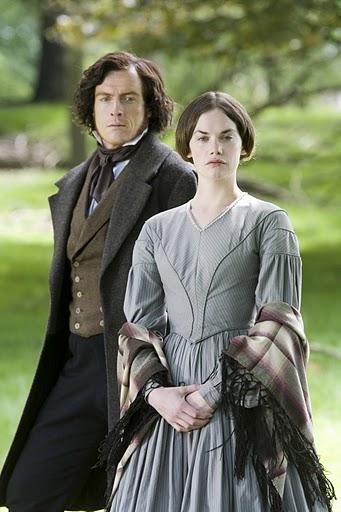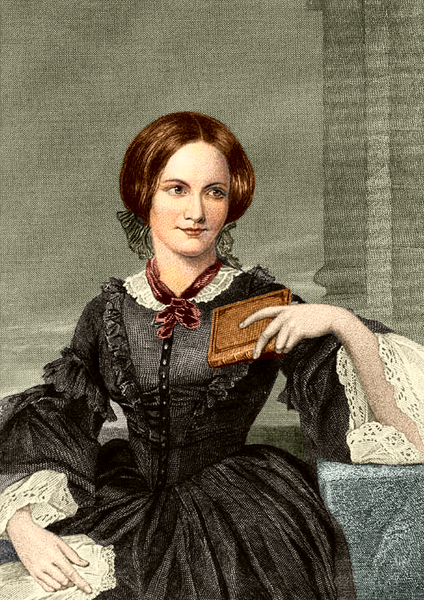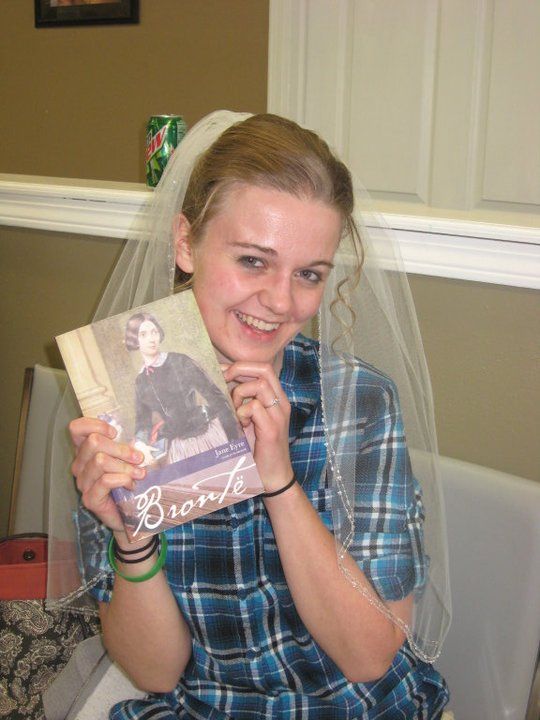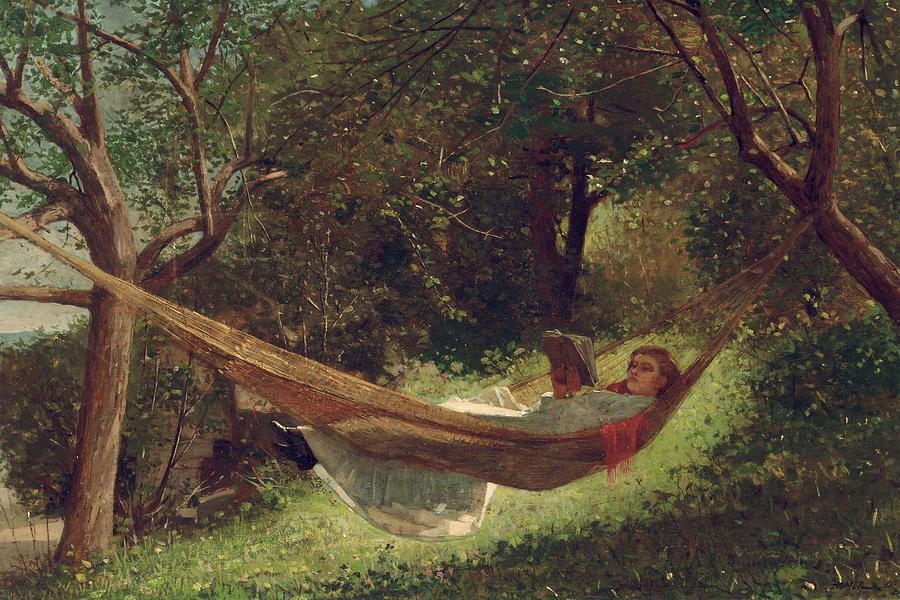You will see the title repeated a lot in this post. I'm just warning you.
As I wrote in last Wednesday's post, I discover something new every time Jane and I get together. This time, besides paying attention to and musing over the bird metaphors (which I may discuss in another post), I was completely struck by the underlying theme of freedom through expression. Actually, this does tie into the bird metaphors, as you will see in just a bit. (Warning: many, many spoilers below! If you haven't read Jane Eyre and want to be surprised, then immediately go find a copy, read it, and then revisit this post.)

The "freedom through expression" thing appears early in the novel- the first chapter, in fact. We discover that Jane, while an emotional child, has never before acted out, for her aunt is appalled at her behavior when she finally reacts against her abusive cousin. In that moment, Jane remembers, "It seemed as if an invisible bond had burst, and that I had struggled out into unhoped-for liberty." Through her reactions, by expressing her deepest self, she is finally free to assert herself and take control of the situation- a small victory for ten year old Jane, but an event that ultimately changes the course of her life.
Throughout the rest of the novel, Jane's life and victories follow this pattern, in large and small ways. For instance, Jane realizes her freedom to escape Lowood and discover her own path when she is honest with herself and mentally "soliloquized" her restlessness and desire for action. Jane also discovers freedom through expression in her growing friendship and then love for Mr. Rochester. From their very first conversation at Thornfield Hall, both discover that they are free to express themselves to the other. Around Jane, Rochester does not need to wear the facade he does around his aristocratic friends; Jane does not have to hide quietly in the shadows, never considered and never free to honestly express herself. While Jane is a very passionate person, she has had to learn to keep her emotions and thoughts within herself, for she never had someone in whom she could confide. Yet with Rochester, she discovers, "he is not of their kind. I believe he is of mine;-I am sure he is,- I feel akin to him,- I understand the language of his countenance and movements; though rank and wealth sever us widely, I have something in my brain and heart, in my blood and nerves, that assimilates me mentally to him." Trust and respect play an equal part in the growth of their friendship and love for the other, fed and nurtured by open communication and the slow revealing of their souls.
Despite her attempts, Jane's love for Rochester does not stay secret; on a stormy night in a garden, (one of the best scenes in the book) she finds freedom only in expression, thereby breaking the last barrier between herself and the friend with whom she has fallen in love. Jane describes the moment perfectly: "The vehemence of emotion, stirred by grief and love within me, was claiming mastery, and struggling for full sway; and asserting a right to predominate: to overcome, to live, rise, and reign at last; yes- and to speak." No longer a bird ensnared in a net or trapped in a cage of her own making, she finally gains a sense of liberation and equality with Rochester in speaking and asserting her love for him. Having done so, she declares that she will leave him, rather than watch him marry another. When he objects, she passionately declares, "I am a free human being with an independent will; which I now exert to leave you." Only in expression does she feel she is truly free to decide her own destiny- which she continues to do throughout the rest of the novel.
Rochester too is a trapped bird, though in other ways than Jane is. Trapped by circumstance rather than feelings, he sees the entrance of Jane into his life as a way out of the existence he has been forced to lead and onto a path to better himself. This is a delicate piece of the book, and one that most readers seem to misunderstand. I have heard many statements about Rochester's cruelty for deceiving Jane or leading her on, for like St. John, many assume that he is a bad man with bad motives. But he isn't. He is merely a man, hemmed in by unhappiness and hopelessness, who finds the peace and happiness he lost so long ago, the keys to the cage that has kept him trapped for so long, in the form of a remarkable woman, his inferior in society but his equal in his soul. He recognizes that Jane's presence has the power to reform him, and he sees a transformation within himself because of her influence. He is a man with a good soul, but he is the product of a desperate, hopeless life. Trapped inside the walls of Thornfield, inside his secrets and lies, he discovers that loving Jane provides the freedom he has so long craved. His love for Jane is his liberation, but he tries to force the lock too early, impatient to stretch his wings. It is only after he has "walked through the valley of the shadow," and fallen on his knees in desperation to God, that he too finds freedom in expression. "That I merited all I endured, I acknowledged- that I could scarcely endure more, I pleaded; and the Alpha and Omega of my heart's wishes broke involuntarily from my lips in the words- 'Jane! Jane! Jane!" Through his cry for Jane, he receives the freedom he has sought for so long, because though they are miles apart, in the depths of their souls they both hear and respond to the other. Freedom through expression indeed.

Jane and Rochester constantly struggle for liberation throughout the book: liberation from their past, their social status and obligations, and the influence of others. And here is the most beautiful part: each of them serves to liberate the other. Their relationship is the "freedom through expression" theme in action. With St. John, who is presented as a contrast to Rochester in the novel, Jane found herself once again trapped, for "he acquired a certain influence over me that took away my liberty of mind...I could no longer talk or laugh freely when he was by..." St. John was the type of man who stifled her sense of self. In comparison, Rochester is her soul's mate because he encourages her freedom of expression and loves her for exactly who she is. She is free to be herself when she is with him; in a very modern throwback from Charlotte Bronte's world in 1847, marriage to Rochester actually gives Jane more independence than she has ever known, an independence of the soul, as well as the body. As Jane ends the book, "To be together is for us to be at once as free as in solitude, as gay as in company. We talk, I believe, all day long: to talk to each other is but a more animated and an audible thinking." Through open communication, through expression, comes trust, respect, and equality. Many women at that time could only dream of such a partnership; thankfully, Jane's and Rochester's once unattainable relationship has now become reality for so many of us. I see Jane Eyre, then, as Charlotte Bronte's own personal act of freedom through expression. Through her written words, she was free to create characters that fell outside the norm of her day; she gave them lines of dialogue that represented her own feelings. Like many other women writers of her time, her novels were the keys to her own cage.
For anyone else who has read Jane Eyre, what is it that you love most about the book? I would love to hear your thoughts!

